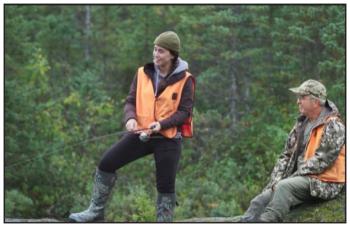Image Caption
Summary
Local Journalism Initiative Reporter
Windspeaker.com
A new five-part documentary series on the work of an Innu scientist is now available for free viewing on the National Film Board of Canada (NFB) website.
The series, titled North Star, features the life of Laurie Rousseau-Nepton, who spent the past six years as a resident astronomer at the Canada-France-Hawaii Telescope in Hawaii.
Rousseau-Nepton recently moved to Toronto. She’ll begin teaching an observational astronomy class at the University of Toronto (UofT) next month.
But she will continue to analyze data obtained from the SIGNALS project, which she supervised during her years in Hawaii.
“The fact I will be at the University of Toronto doesn’t change that,” Rousseau-Nepton said.
The SIGNALS project, which included about 60 researchers from around the world, aims to discover the mysteries of star formation to get a better understanding of the significance that stars have in the universe.
Now that she is living in Toronto, Rousseau-Nepton is looking to expand the team that will be looking at data compiled during her work in Hawaii.
“I’m very excited,” she said. “I’m looking to build a team of maybe 10 new members.”
Rousseau-Nepton said this will include UofT providing funding to hire either one or two postdoctoral researchers.
As for the documentary series on her, Rousseau-Nepton is hoping it will prove to be inspirational.
“I hope it will trigger some participation from First Nations to be involved in science,” she said. “I always like to remember myself as a young girl and what I wanted to do with my life. The goal for me is to inspire young ladies, wherever they are from.”
All five episodes of North Star, which are each about 15 minutes long, had their world premiere on the NFB website on Aug. 21. They can be viewed here at www.nfb.ca
Besides scenes of Rousseau-Nepton detailing her work, episodes include animated graphics that explain scientific concepts.
The first episode in the series is titled “Observation” and it features Rousseau-Nepton and her father reminiscing at the Ashuapmushuan Wildlife Reserve in Quebec.
The reserve is located in the region of Saguenay-Lac-Saint-Jean and it is where her interest in astronomy began.
“When I was little, I really loved watching for shooting stars and the Northern Lights,” Rousseau-Nepton said at the start of the episode. “And I remember looking up at the sky and wondering, ‘How on earth does all that work.’ I was totally astounded at all that.”
Episode two in the series is titled “Research” and it features Rousseau-Nepton at her work at the Canada-France-Hawaii Telescope.
Her job took her to the picturesque summit of Hawaii’s Mauna Kea, a dormant volcano. There Rousseau-Nepton and her team were able to utilize state-of-the-art equipment to scan the skies.

Episodes three and four are titled “Light” and ‘Collaboration”, respectively. They feature Rousseau-Nepton and a female intern who tour the telescope observatory, which is located at a breathtaking estimated 4,200 metres above sea level.
The pair also discuss the SIGNALS project and the role women play in astrophysics.
The final episode is called “Origins” and demonstrates how Rousseau-Nepton has a unique worldview because of her scientific knowledge and Innu culture.
In a promotional interview for the series, director Patrick Bosse said he was keen to work with Rousseau-Nepton after hearing her discuss her career on radio.
“I found her really relevant and engaging as a science popularizer and communicator,” Bosse said. “At the time, I was doing research for a documentary on space junk. I quickly realized that this wasn’t a topic that fit in well with her practice.”
Yet Bosse was very much interested in telling Rousseau-Nepton’s story.
“I realized that she defies all kinds of stubbornly entrenched stereotypes about science,” he said. “First, she’s a young woman in a field that’s still very male dominated. She’s very active but very grounded as well. She’s very involved in the community. She’s interested in the local Hawaiian culture.
“And with her Innu background, she draws inspiration from ancestral knowledge of astronomy.
We’re a long way from the classic image of a socially challenged mad scientist holed up in his basement. To my eyes, Laurie embodies a new way of doing science.”
Local Journalism Initiative Reporters are supported by a financial contribution made by the Government of Canada.

